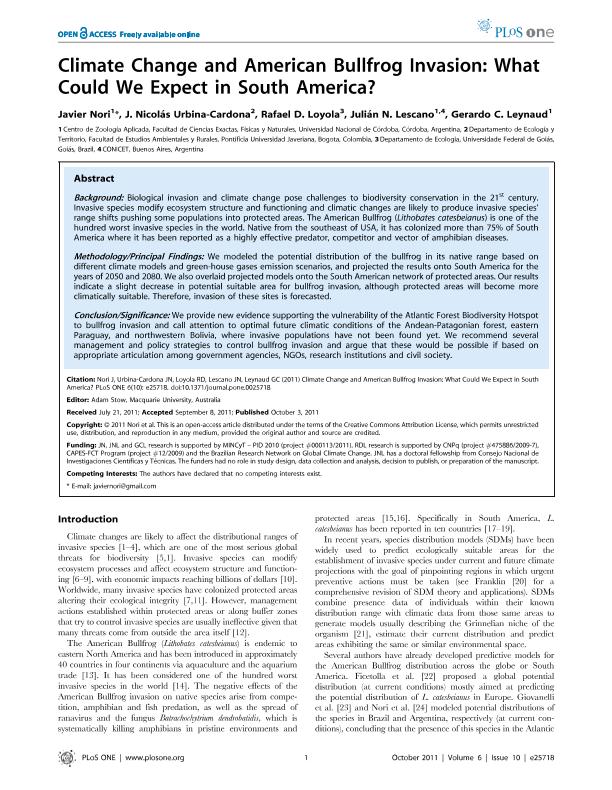Artículo
Climate change and American Bullfrog invasion: What could we expect in South America?
Nori, Javier ; Urbina Cardona, Nicolás; Loyola, Rafael; Lescano, Julián Norberto
; Urbina Cardona, Nicolás; Loyola, Rafael; Lescano, Julián Norberto ; Leynaud, Gerardo Cristhian
; Leynaud, Gerardo Cristhian
 ; Urbina Cardona, Nicolás; Loyola, Rafael; Lescano, Julián Norberto
; Urbina Cardona, Nicolás; Loyola, Rafael; Lescano, Julián Norberto ; Leynaud, Gerardo Cristhian
; Leynaud, Gerardo Cristhian
Fecha de publicación:
10/2011
Editorial:
Public Library of Science
Revista:
Plos One
ISSN:
1932-6203
Idioma:
Inglés
Tipo de recurso:
Artículo publicado
Clasificación temática:
Resumen
Background: Biological invasion and climate change pose challenges to biodiversity conservation in the 21century. Invasive species modify ecosystem structure and functioning and climatic changes are likely to produce invasive species? range shifts pushing some populations into protected areas. The American Bullfrog ( Lithobates catesbeianus ) is one of the hundred worst invasive species in the world. Native from the southeast of USA, it has colonized more than 75% of South America where it has been reported as a highly effective predator, competitor and vector of amphibian diseases.Methodology/Principal Findings: We modeled the potential distribution of the bullfrog in its native range based on different climate models and green-house gases emission scenarios, and projected the results onto South America for the years of 2050 and 2080. We also overlaid projected models onto the South American network of protected areas. Our results indicate a slight decrease in potential suitable area for bullfrog invasion, although protected areas will become more climatically suitable. Therefore, invasion of these sites is forecasted. Conclusion/Significance: We provide new evidence supporting the vulnerability of the Atlantic Forest Biodiversity Hotspot to bullfrog invasion and call attention to optimal future climatic conditions of the Andean-Patagonian forest, eastern Paraguay, and northwestern Bolivia, where invasive populations have not been found yet. We recommend several management and policy strategies to control bullfrog invasion and argue that these would be possible if based on appropriate articulation among government agencies, NGOs, research institutions and civil society.
Archivos asociados
Licencia
Identificadores
Colecciones
Articulos(IDEA)
Articulos de INSTITUTO DE DIVERSIDAD Y ECOLOGIA ANIMAL
Articulos de INSTITUTO DE DIVERSIDAD Y ECOLOGIA ANIMAL
Citación
Nori, Javier; Urbina Cardona, Nicolás; Loyola, Rafael; Lescano, Julián Norberto; Leynaud, Gerardo Cristhian; Climate change and American Bullfrog invasion: What could we expect in South America?; Public Library of Science; Plos One; 6; 10; 10-2011; 1-8
Compartir
Altmétricas



